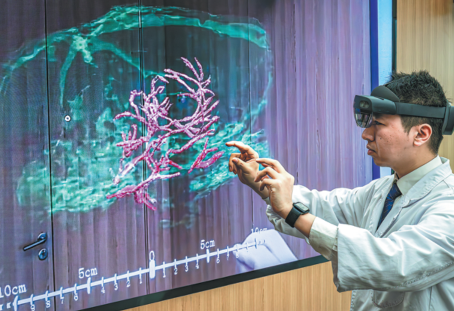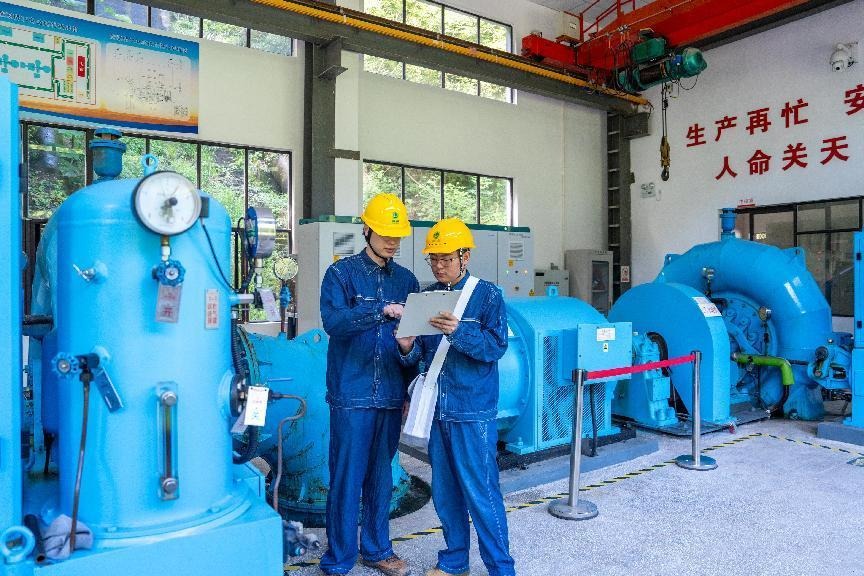AI opens up new opportunities as it closes urban-rural education gap

China is riding the wave of an AI-powered transformation. As artificial intelligence reshapes industries and daily life, it is not only driving automation and increasing efficiency but also unlocking new possibilities.
Picture this: The classroom blackboard is replaced with a big screen and students click on tablets to answer questions instead of writing with pencils. AI makes it a reality, offering novel learning pathways for Chinese students and bridging the urban-rural digital divide.
At a middle school in Guiyang, Guizhou province, English teacher Zeng Xing found AI to be a game-changer during her 17-year career thanks to a smart classroom system developed by Chinese AI giant iFLYTEK.
Zeng assigns exercises to her students via teaching tablets in the classroom and the students can instantly submit their answers back. Simultaneously, the big screen at the front of the classroom shows the detailed answers of each student.
By analyzing results with AI and big data, the system enables Zeng to deliver tailored instructions that address the specific needs of each student. "We can now quickly identify students' weaknesses and make teaching plans accordingly, which is far more efficient than before," she says.
The smart classroom system also enables students to improve their speaking skills through personalized, interactive dialogues sourced from a vast database of English movies, news and poetry. AI can evaluate students' pronunciation and provide feedback, helping them speak more accurately and with greater confidence.
"AI has created opportunities for basic education in remote areas like Guizhou," says Huang Hui, head of Zeng's middle school where complex terrain and challenging transportation systems limit educational resources.
AI-powered tools play an important role in bridging urban-rural education gaps by expanding teaching resources and improving accessibility, Huang adds.
Besides improving the effectiveness of classroom learning, AI also enriches students' extracurricular experiences.
At Tsinghua University Primary School, students participate in AI-assisted physical activities during break time. By waving their hands, they can activate smart sports equipment to track their exercise duration and frequency.
In addition to basic education, AI has a significant impact on higher education. As Chinese AI assistant DeepSeek gains popularity, many colleges and universities have announced its integration into their server systems.
Colleges and universities, as innovation hubs and talent incubators, should actively embrace new technologies and take on a leading role, says Wang Lei, professor at Beijing Normal University's School of Government.
"When conducting scientific research, tasks like project design, mass data collection and literature collation are time-intensive," says Qian Minghui, who works at the Renmin University of China. "Using DeepSeek with a dedicated document database can greatly improve efficiency. It acts as a research assistant and can help provide research clues and identify suitable partners."
The AI-led technological revolution brings major opportunities for education, China's Minister of Education Huai Jinpeng said during an interview on the sidelines of the national legislature's annual session.
He revealed that China will release a white paper on AI education in 2025 to help equip students with enhanced literacy and skills for the digital and AI era.
In the upcoming fall semester, primary and secondary schools in Beijing will offer at least eight class hours of AI instruction per academic year to nurture future-oriented and innovative talent.
Despite AI's advantages in transforming education, it raises concerns about data security, privacy and academic integrity.
"It is crucial to establish policies on AI usage, enhance technological oversight, and strengthen ethics education for teachers and students," says Tang Liang, deputy director of the information center at the Beijing Academy of Educational Sciences.
Xinhua

Today's Top News
- Chinese, Russian navies to hold joint exercise, patrol
- Childcare subsidy applications to start in late August
- CPC leadership holds symposium to seek advice on economic work
- 20th CPC Central Committee to hold fourth plenary session in October
- Stable, healthy Sino-US business ties beneficial to all
- Fifth volume of 'Xi Jinping: The Governance of China' published































